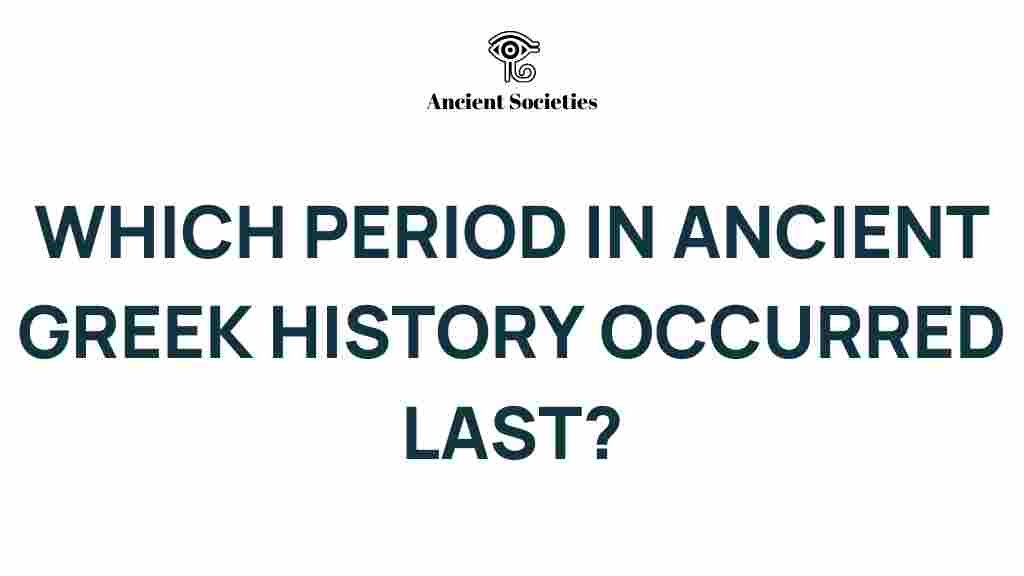Unraveling Time: What Was the Final Chapter of Ancient Greek History?
Ancient Greece is often celebrated as the cradle of Western civilization, a period that fostered remarkable advancements in philosophy, politics, art, and science. Understanding the final chapter of Ancient Greek history is crucial to grasping the broader narrative of human civilization. This article explores the historical timeline of Ancient Greece, focusing on the Hellenistic period, its cultural legacy, and the archaeological discoveries that illuminate this fascinating era.
The Historical Timeline of Ancient Greece
The history of Ancient Greece can be divided into several key periods:
- Mycenaean Period (c. 1600–1100 BCE): Marked by the rise of powerful kingdoms and impressive architectural achievements.
- Dark Ages (c. 1100–800 BCE): A period of decline following the fall of Mycenaean civilization.
- Archaic Period (c. 800–500 BCE): Characterized by the emergence of city-states (poleis) and the development of the Greek alphabet.
- Classical Era (c. 500–323 BCE): The height of Greek culture, philosophy, and democracy, culminating in the Peloponnesian War.
- Hellenistic Period (323–30 BCE): The era that began with the death of Alexander the Great, leading to the spread of Greek culture across the Mediterranean and Near East.
Each of these periods contributed to the rich tapestry of Ancient Greek history, influencing subsequent generations and laying the groundwork for modern Western civilization.
Understanding the Hellenistic Period
The Hellenistic period represents the final chapter of Ancient Greek history, characterized by significant cultural and political changes following the conquests of Alexander the Great. This era saw the fragmentation of the Macedonian Empire into various Hellenistic kingdoms, each with its own unique contributions to civilization.
Key Features of the Hellenistic Period
The Hellenistic period brought forth a fusion of Greek culture with the cultures of the East. Here are some key features of this period:
- Expansion of Greek Culture: Greek language, art, and philosophy spread throughout the Mediterranean and Near Eastern territories.
- New Philosophical Schools: The rise of schools such as Stoicism and Epicureanism, which emphasized personal ethics and the pursuit of happiness.
- Advancements in Science and Technology: Innovations in mathematics, astronomy, and medicine, with figures like Euclid and Archimedes leading the way.
The Hellenistic period significantly altered the socio-political landscape, diminishing the power of city-states while fostering a cosmopolitan culture that integrated diverse influences.
Archaeological Discoveries and Their Impact
Numerous archaeological discoveries from the Hellenistic period have provided invaluable insights into Ancient Greek civilization. Excavations at sites such as Alexandria, Pergamon, and Delos have unearthed artifacts, inscriptions, and structures that illuminate daily life, religious practices, and artistic achievements.
Significant Archaeological Sites
- Alexandria: Once the capital of the Ptolemaic Kingdom, Alexandria was a center of learning, home to the famous Library of Alexandria.
- Pergamon: Known for its impressive altar and library, Pergamon was a hub for art and culture.
- Delos: A sacred island that was a major religious center, famous for its temples and sanctuaries.
These sites reveal the extent of Greek influence and the blending of cultures, showcasing how Ancient Greece adapted to and integrated with other civilizations.
The Greek Legacy: Cultural and Historical Impact
The legacy of Ancient Greece, particularly during the Hellenistic period, is profound and far-reaching. The blending of cultures laid the groundwork for the Roman Empire and influenced the development of European art, philosophy, and governance.
Lasting Contributions of Ancient Greece
- Philosophy: The works of philosophers such as Plato and Aristotle remain foundational texts in Western thought.
- Art and Architecture: The aesthetic principles established in Ancient Greece continue to shape modern design and architecture.
- Political Thought: Concepts of democracy and civic duty, originating in city-states like Athens, have influenced modern political systems.
Furthermore, the Hellenistic period’s emphasis on cosmopolitanism foreshadowed the interconnectedness of cultures in our contemporary world.
Troubleshooting Historical Misunderstandings
As we explore the final chapter of Ancient Greek history, it’s essential to address common misconceptions:
- Misconception 1: The Hellenistic period marked the decline of Greek culture.
In reality, it was a time of cultural flourishing and expansion. - Misconception 2: Alexander the Great’s conquests solely aimed at military dominance.
His campaigns also facilitated cultural exchange and integration. - Misconception 3: The influence of Ancient Greece ended with the fall of the Hellenistic kingdoms.
Greek culture continued to thrive and influence the Roman Empire and beyond.
By correcting these misunderstandings, we can better appreciate the complexity and richness of Ancient Greek history.
Conclusion
In conclusion, the final chapter of Ancient Greek history, encapsulated in the Hellenistic period, represents a transformative era that shaped the future of Western civilization. The archaeological discoveries from this period reveal a vibrant tapestry of culture, philosophy, and innovation. The Greek legacy continues to resonate today, reminding us of the enduring influence of Ancient Greece on contemporary culture and society.
For those interested in delving deeper into the wonders of Ancient Greece, exploring archaeological sites and museums can provide a tangible connection to this remarkable civilization. Discover more about Ancient Greek archaeological sites and their significance in modern culture.
Ultimately, understanding the history of Ancient Greece is not just about the past; it is about recognizing the threads of influence that continue to weave through our lives today.
For further reading on the impact of Ancient Greece on modern civilization, you can visit this external resource.
This article is in the category History and created by AncientSocieties Team
